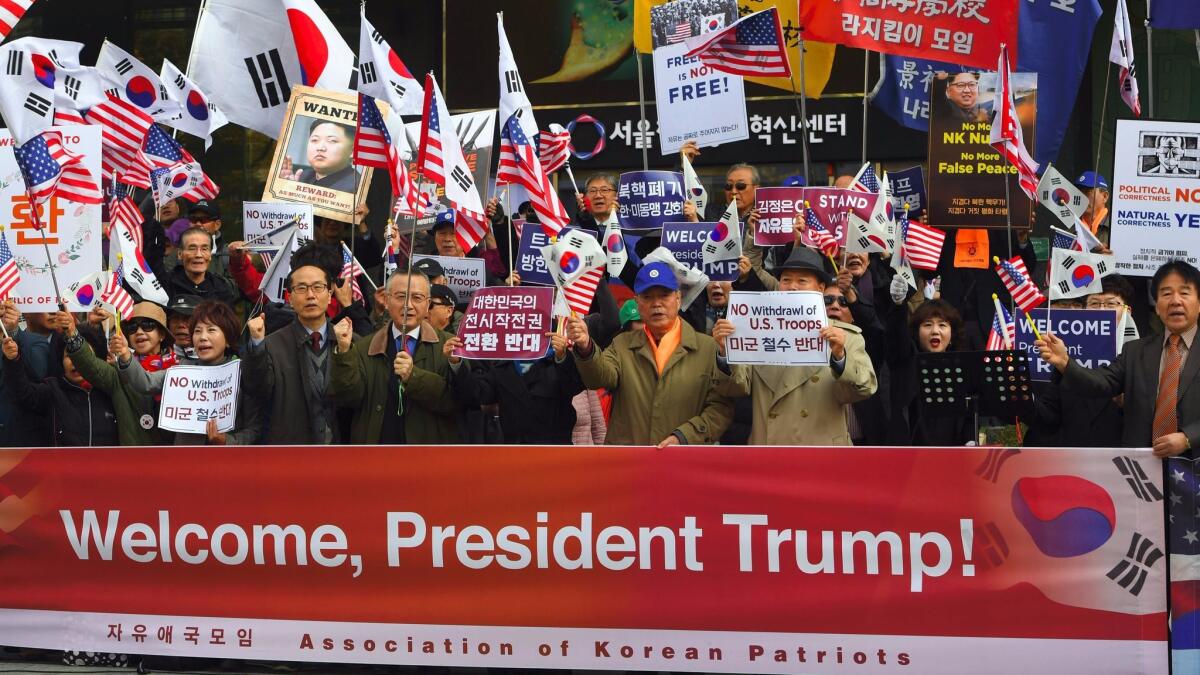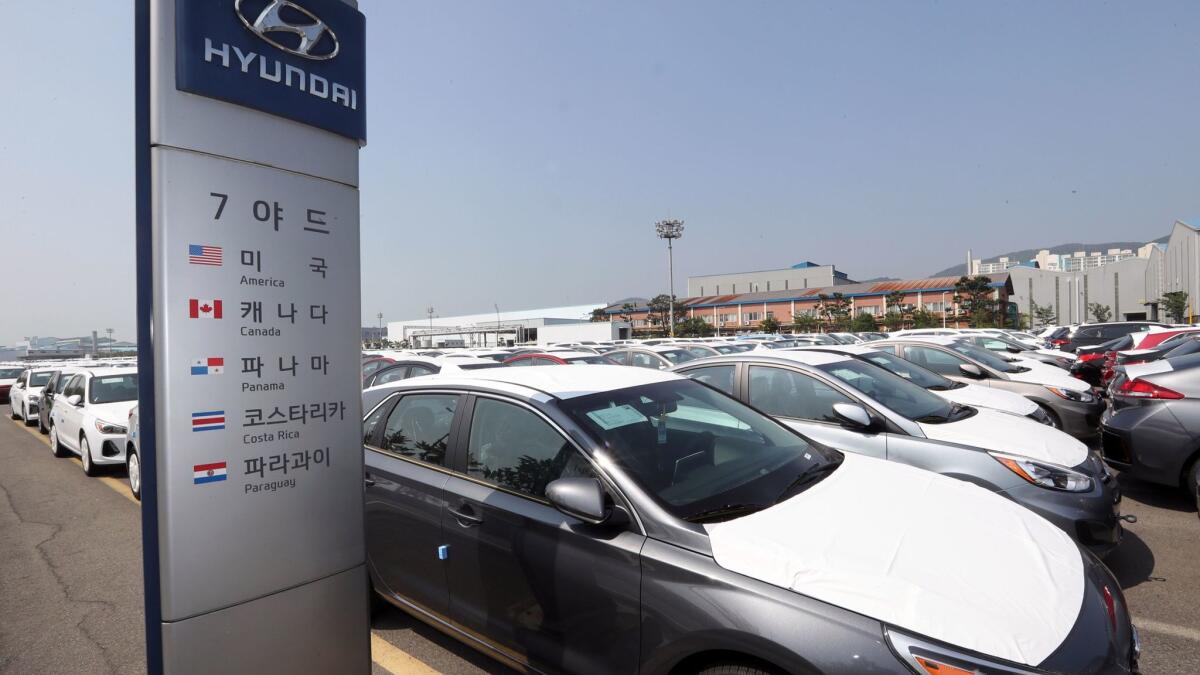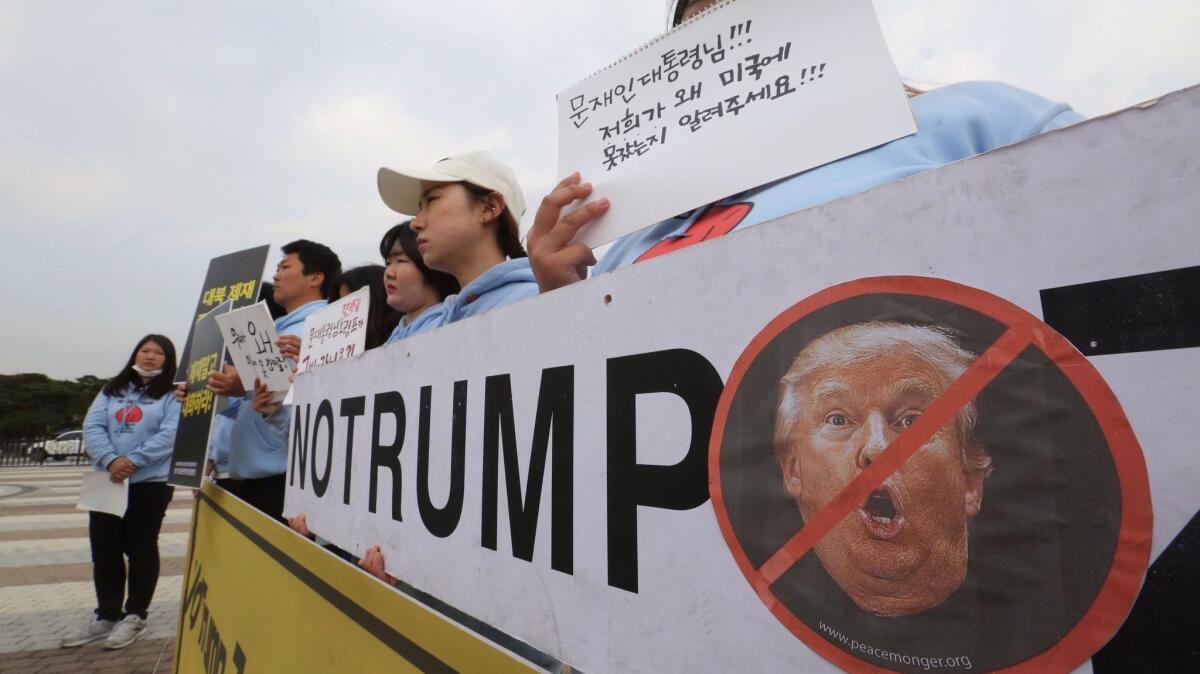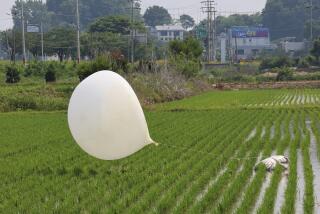As Trump visits Seoul, talk likely to focus on ‘horrible’ trade deal. Koreans don’t see it that way

President Trump’s political pitch at home about a bilateral trade accord with South Korea has been clear: It’s a “horrible,” “job-killing” deal that hurts American workers.
South Koreans, though, don’t see it that way.
Trump’s repeated condemnations and threats to scrap the U.S.-South Korea free trade agreement have worried local business executives, angered editorial writers and even sparked a brief dip in Korean financial markets.
“It’s quite confusing that Trump would say those words about a bilateral pact that has been in place for more than five years, especially his threat to get rid of the deal,” said Kim Kyung-mi, an elementary school teacher from Suwon, a Seoul suburb.
The issue, fraught with domestic politics in both countries, is likely to be a key topic between Trump and his South Korean counterpart, Moon Jae-in, when the two leaders meet Tuesday during the second leg of the president’s 12-day Asia tour.
Trump has said he wants to change or abandon the agreement, enacted under President Obama, which eliminates many tariffs and other trade barriers. Many business leaders in both countries say it’s a useful policy propelling the $112-billion trade relationship with South Korea, the United States’ sixth-largest goods partner and Asia’s fourth-largest economy.
But Trump is concerned about a negative trade balance with South Korea, meaning the United States buys more from its longtime ally than it sells — a fact economists say is partially attributable to Americans’ desire for South Korean automobiles and electronics.

Trump has made his displeasure known not just on the campaign trail, but also in diplomatic settings. At a White House meeting with Moon in June, for example, Trump and his team complained forcefully — in front of the press.
“The fact is that the United States has trade deficits with many, many countries, and we cannot allow that to continue. And we’ll start with South Korea right now,” Trump said, looking across the table at Moon.
Moon’s calmly responded, in part: “Trade between two countries always needs to be approached critically.”
Since that meeting, Trump and his trade representative have suggested the United States would scrap the deal without changes, much as Trump scrapped the Trans-Pacific Partnership with 11 Pacific Rim countries, not including South Korea.
South Korea first agreed to study the United States’ concerns, pleading for “objective statistics and logic.” But that changed recently, leading newspapers to question whether Moon had surrendered to Trump’s threats.
Trump’s fervor on the issue has also sparked conspiracy theories among some South Koreans. One is that Trump’s goal is for South Korea to purchase more American military hardware, or that his trade policies are designed to win votes in the Rust Belt.
“Many people see this as as political gesture, that there is a political motivation behind this,” said Jee-kwang Park, a research fellow at the Sejong Institute near Seoul.

Park believes many South Koreans don’t fully understand the agreement, which many experts say helps keep the United States competitive with other Asian nations that have their own deals. The United States exported more than $42 billion in goods to South Korea last year, led by appliances, such as refrigerators and air conditioners, and chemicals, such as beauty supply ingredients, according to the United Nations Comtrade Database.
The trade balance has in fact nearly doubled since the deal took effect, from $16.6 billion in 2012 to $27.5 billion last year, according to the U.S. Census Bureau, and Trump remains convinced that’s a problem. (Other countries, including China, Germany, Japan and Mexico also export more to the United States than they import).
His position isn’t winning popular support here, though. About 65% still oppose renegotiation of the deal, according to a poll last month by the Korea Times. Only about 6% of the respondents said they had no opinion, suggesting that the trade issue has registered with average South Koreans — more so, probably, than it has with Americans.
Both the U.S. Chamber of Commerce and its California chapter oppose scrapping the deal. South Korea is California’s seventh-largest export destination, exporting more than $8.2 billion in goods last year.
The United States remains a key trading partner for South Korea, a democracy of 50 million people where the economy is heavily dependent on exports.
A perceived dependency on the United States, for both its economy and its safety from North Korea, is a recurring theme in conversations with South Koreans. That may be changing, however.
“I grew up learning in school that we always ‘owe’ the U.S. something,” said Yoon Ik-hyun, a taxi driver, referring to the Korean War and the country’s ascendance since then. “The younger generations don’t think that. If I just grew up seeing this guy, then I don’t think I would like Americans much either. They now just seem greedy and selfish.”
ALSO
Escalating tension has experts simulating a new Korean War, and the scenarios are sobering
Stiles is a special correspondent.
More to Read
Sign up for Essential California
The most important California stories and recommendations in your inbox every morning.
You may occasionally receive promotional content from the Los Angeles Times.











